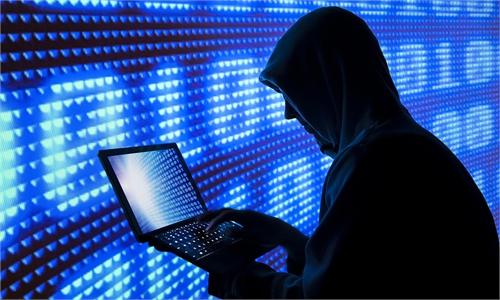
Photo: VCG
The first contemporary serialized comic on the subject of national security went online on Sunday. The mysterious actions of China's Ministry of State Security (MSS) have recently been partially unveiled through blockbuster articles and novel cartoons, generating significant public interest. I believe that China has come to the cusp of international geopolitics, making it the perfect time to popularize and educate the public on national security knowledge.At the same time, we must correctly interpret the national security publicity and education this time. Some Western media are trying to describe it as a mass mobilization of Chinese society to "catch spies," and we must expose their malicious speculation. Our domestic public opinion, especially that on the internet, should objectively and truthfully recognize the situation we are facing, and boost the publicity to the world in order to counter the distorted speculations of the US and the West. Opening-up will inevitably be accompanied by certain national security risks, and China is capable of handling the coordination and balance between expanding high-quality opening-up and continuously plugging the loopholes of national security.
Objectively speaking, MSS has long been one of the world's most low-profile national security authorities. News involving national security is rare, and spy movies and other literary creations are also very scarce in China. I have often complained to relevant authorities that since the US usually arrest "Chinese spies," many of which are not spies at all, why don't we disclose some spying cases from the US and the West, even from the Taiwan island? Our national security departments must have made many such discoveries. I have always believed that it is beneficial for conducing external struggles and raising the public's alertness by publishing some cases from time to time. Through great efforts, Global Times, the media I worked as editor-in-chief, was exclusively informed of some cases of spies by the national security authorities, and made quite sensational reports at the time.
In previous years, the national security awareness of many Chinese people was indeed too weak. As far as I know, there have been many instances in which individuals in important sectors have been successfully induced by foreign spy agencies. Some of them I personally know, and they simply lacked a strong sense of national security and fell into the trap set by foreign spy organizations, resulting in serious consequences such as imprisonment or dismissal from public positions, abruptly ending their personal prospects.?. It is crucial for all of us to have a basic understanding of national security as it serves as our protection. In my opinion, the publicity by MSS has played an important role in providing remedial education, which is particularly timely given the increasing intensity of the geopolitical struggle instigated by the US.
In addition, I want to add some other perspectives to grasp the whole picture of the relationship between our normal life and national security. National security is the awareness and cognitive ability that we must have as nationals of a rising power. However, we should not be fearful of the higher risks associated with this issue, nor should we exaggerate the personal risks of being locked up by it. Both social institutions and individuals should strive to strike a balance between being careless and overly sensitive, ensuring that national security does not disrupt or limit our normal work and life. The reality is that the national security risks we face are highly controllable.
As long as a person strictly follows the law and regulations, does not seek personal gain, promptly reports any suspicious incidents to the authorities, and firmly refuses obvious attempts to lure, corrupt, or bribe, they will be safe. Foreign intelligence agencies often develop relationships with sources by starting with legal contacts, offering benefits beyond the norm, and gradually pushing the relationship toward illegal activities until they reveal their true intentions, using both incentives and threats to involve the person. Developing sources through the internet follows a similar pattern. As long as a person has a basic sense of confidentiality, does not seek personal gain, never trades classified materials, or uses leaked information to raise their own value, has the courage to reflect, extricates themselves, and honestly reports to the authorities when encounter anomalies during contact, they will avoid falling into a trap. Most of those who are eventually implicated are driven by personal interests, seeking personal gain. When they realize they have fallen into a trap, they lack the courage to firmly extricate themselves and hold onto fantasies about the risks.
We must ensure security, but we cannot completely cut off contact with overseas individuals or refrain from participating in international exchanges solely for the sake of ensuring security. That would be an overreaction. Many professionals, like myself, have had numerous interactions with foreign individuals, including some with backgrounds in foreign spy agencies. However, this has not affected my personal safety or led to any suspicions from authorities regarding national security.
The national security agencies are conducting national security education in response to the increasingly severe geopolitical situation, which further enhances the awareness of the whole society and greatly contributes to the consolidation of national security. However, the purpose of doing so is to further promote the country's opening-up to the outside world, making the process of opening-up safer and making it more difficult for hostile forces to find opportunities. In addition, strengthening national security does not mean "treating everyone as spies." The legitimate rights and interests of all foreign nationals entering our country will continue to be protected, which is a basic condition for our continued opening-up and expanding exchanges with foreign countries. Our efforts to strengthen national security will be highly consistent with this basic principle. In short, the true essence of national security lies in accompanying national opening-up. This approach encourages our entire society and promotes its resilience.
We must have a correct understanding and accurate interpretation of national security. I have seen some people on the internet advocating "everyone to come together to catch spies," calling for caution when contacting with foreigners. Additionally, some personnel in certain institutions are even actively reducing exchanges with the outside world due to concerns. Some institutions have also made the approval process for contact with foreigners very complicated. All of these are incorrect and seriously inconsistent with the overall goal of strengthening national security.
Finally, I would like to emphasize that we are currently caught in the midst of geopolitical turbulence, facing strong winds and rough waves. However, it is crucial that we do not retreat and seek a false sense of security by isolating ourselves. Instead, China must embrace a strategy of expanding high-quality opening-up to the global community, as there is no alternative. It is important to note that national security will accompany and safeguard this process of opening-up.
The author is a Chinese media professional. opinion@globaltimes.com.cn


